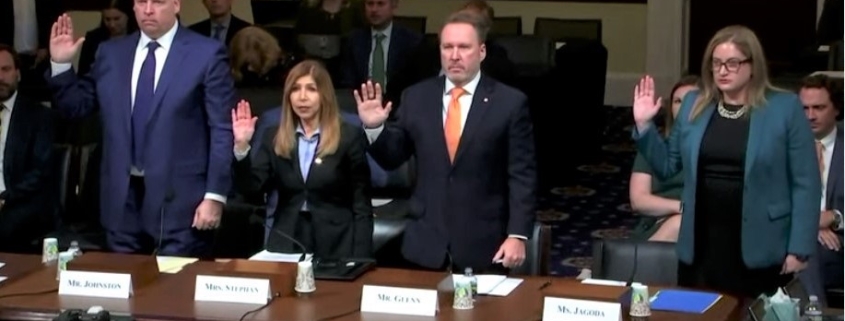DA Stephan Testifies Before Congressional Committee About Strategies to Fight Organized Retail Crime
San Diego County District Attorney Summer Stephan testified in Washington, D.C. today before the House Sub-Committee on Counterterrorism, Law Enforcement and Intelligence, providing her perspective on the increasing crime of organized retail theft. At a hearing titled, “From Festive Cheer to Retail Fear: Addressing Organized Retail Crime,” DA Stephan discussed the scope of the problem in the U.S., the solutions being pursued by law enforcement and success stories in holding retail thieves accountable. Stephan appeared in her capacity as both San Diego DA and President-Elect of the National District Attorneys Association.
WATCH the DA’s full testimony, here.
DA Stephan told committee members there are three key challenges facing prosecutors across the nation who are working to fight organized retail theft:
The evolution of more sophisticated criminal networks. Organized retail theft is no longer just the work of isolated petty criminals. Instead, it has evolved into highly sophisticated operations, often conducted by well-organized networks and coordinated across multiple locations.
An inadequate legal framework. Existing laws and penalties in many states are not sufficient to deter or appropriately punish those engaged in organized retail theft. Many states including California have passed laws that increased the dollar amount of theft that qualifies as a felony and eliminated enhanced consequences for recidivist and habitual offenders.
The need for better coordination. In the past, the lack of coordination and information-sharing among retailers, law enforcement agencies, and other stakeholders has hindered the ability to combat organized retail theft effectively. A continued collaborative and multi-faceted approach is necessary to address this issue comprehensively.
Stephan pointed to laws in several states that raised the threshold of the value of merchandise stolen from retail stores in order to qualify for felony charges.
“Law enforcement and our retailers agree that the increase in retail theft-related incidents has been the direct result of changing laws and penalties for shoplifting,” DA Stephan said. “The message that these deficient laws send is that this is the wild west with no rules or accountability.”
The San Diego County DA’s Office has made prosecuting and preventing organized retail crime a priority. DA Stephan formed a specialized team of prosecutors and investigators to combat organized retail theft and work with businesses to build stronger cases.
Stephan praised Congress for passing the INFORM Act, which became law this year and requires online marketplaces, such as Amazon and eBay, to collect, verify, and disclose certain information from high-volume sellers and provide consumers with means to report suspicious activity.
“This is a step in the right direction to stop organized criminals from selling stolen goods on online marketplaces,” said Stephan said. “It removes the anonymity of the seller and makes it easier for law enforcement to find online sellers of stolen goods and prosecute them.”
Stephan also urged the passage of H.R. 895, the Combating Organized Retail Crime Act of 2023— which would expand federal enforcement of criminal offenses related to organized retail crime and establish an Organized Retail Crime Coordination Center within the Department of Homeland Security.
“The good news is that on both the national and statewide level, there is a commitment to stop organized retail crime. At least 34 states now have organized retail crime laws. It’s important that these laws include increased penalties for those involved in these criminal activities and provisions that enable law enforcement to better investigate and prosecute offenders,” DA Stephan said.
Stephan also relayed her experience to committee members of visiting stores targeted by retail thieves and talking to workers about the trauma and fear that they experience from these brazen crimes. In a recent study, retailers reported an increase in violence and aggression by the criminals committing these crimes. “This is not a victimless crime,” Stephan said.



